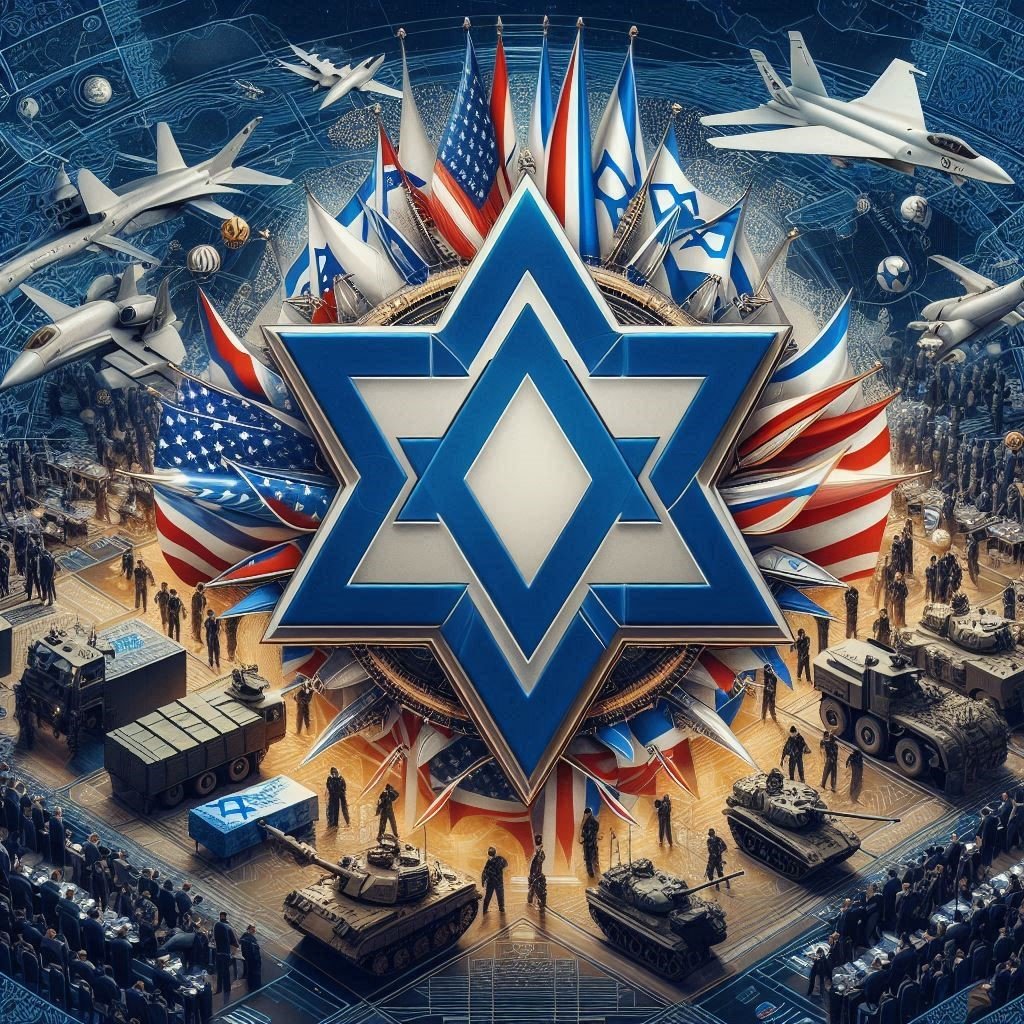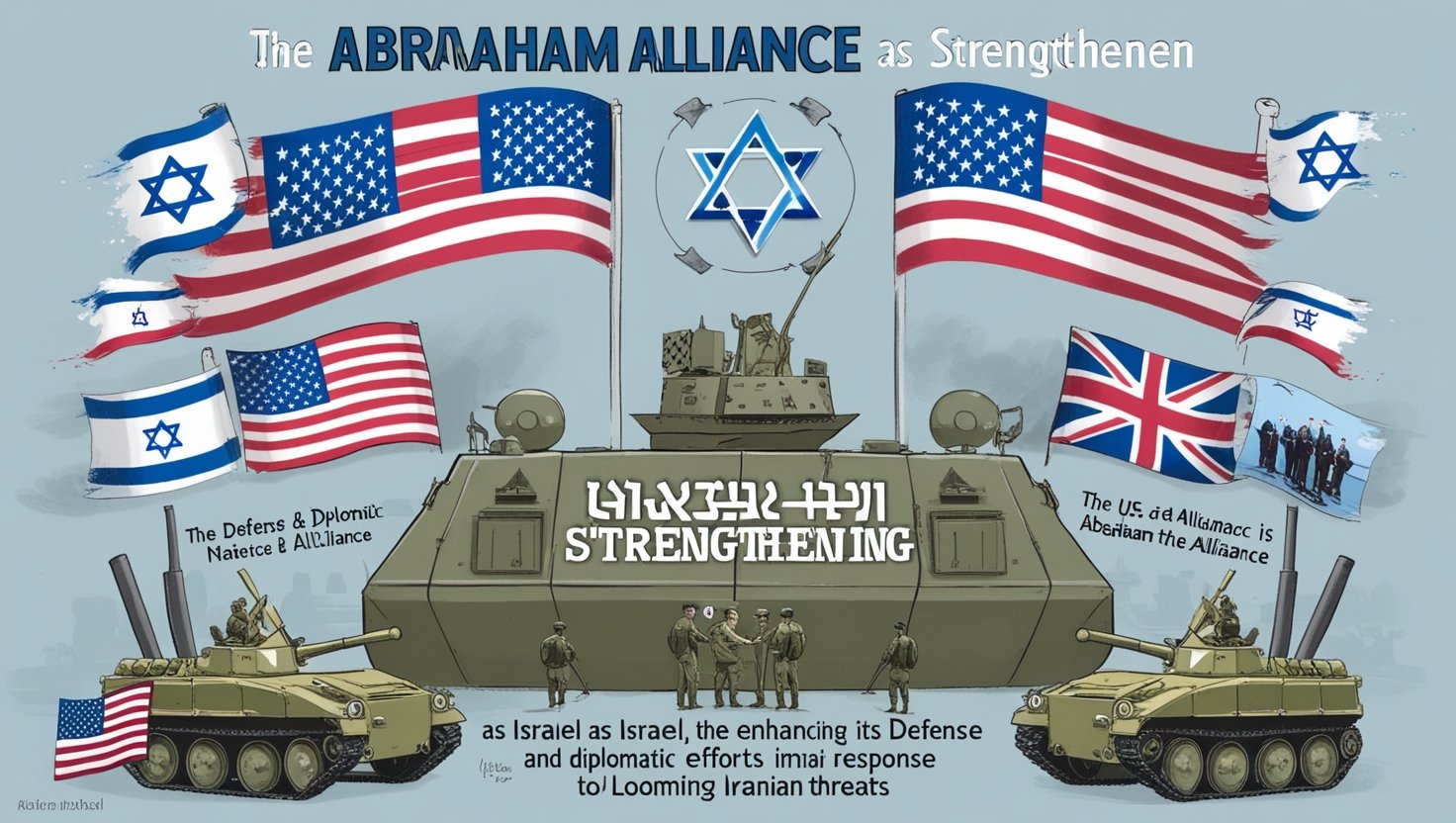Fortifying Abraham Alliance: Israel’s Strategic Response to Iranian Threats in the New Middle East
Forging a Shield: Israel’s Strategic Abraham Alliance with the U.S. and U.K. in the Face of Iranian Threats

Recent escalations in the Middle East, particularly the direct Iranian missile and drone strikes against Israel, have prompted a significant reassessment of defence and diplomatic strategies in the region. As Israel grapples with the intensifying threat from Iran, it is actively seeking to strengthen its alliances, particularly the “Abraham Alliance-Abraham Accords,” which aim to bolster cooperation with the United States and the United Kingdom.
The Iranian Threat AND Abraham Alliance

On April 13, 2024, Iran launched a historic strike on Israeli territory, marking a pivotal moment in the ongoing conflict between the two nations. This unprecedented attack involved a barrage of ballistic missiles and drones, retaliating against Israeli airstrikes that had targeted Iranian military assets in Syria. The Iranian leadership framed this response as a demonstration of resolve, aiming to restore deterrence against Israeli aggression and signalling a shift from proxy warfare to confrontation.
This escalation has raised alarms not only in Israel but also among its allies, prompting discussions about the implications for regional security and the potential for broader conflict. The U.S. and UK have reiterated their commitment to Israel’s security, emphasizing the need for a coordinated response to Iranian provocations.
Strengthening the Abraham Alliance and ACCORDS
In light of these developments, Israel is focusing on enhancing the Abraham Accords, a series of normalization agreements with several Arab nations, including the UAE and Bahrain, which were brokered with U.S. support in 2020. The objective is to create a united front against Iranian aggression while fostering economic and military cooperation among signatory nations.
Israeli officials have expressed hopes that strengthening ties with the U.S. and UK will provide not only military support but also diplomatic backing in international forums. This collaboration is seen as crucial for countering Iran’s influence in the region, particularly as Tehran continues to assert its military capabilities and expand its reach through proxies like Hezbollah and Hamas.
Geopolitical Implications OF Abraham Alliance
The geopolitical landscape in the Middle East is shifting rapidly. The Iranian-Israeli conflict is increasingly viewed through the lens of broader U.S.-China rivalry, with implications for global security dynamics. As Iran enhances its military capabilities, including the development of precision-guided missiles and drones, Israel’s reliance on advanced defence systems becomes more critical. The cost disparity between offensive and defensive military operations has raised concerns about the sustainability of Israel’s defence posture.
Moreover, the potential for a larger conflict involving U.S. interests in the region cannot be overlooked. Washington’s strategic calculations are complicated by the need to balance support for Israel with the risks of escalating tensions that could draw the U.S. into a confrontation with Iran.
Recent Developments and Statements
In the wake of the Iranian strikes, Israeli Prime Minister Benjamin Netanyahu vowed to respond decisively, indicating that Israel would not tolerate direct attacks on its sovereignty. Meanwhile, U.S. officials have reiterated their commitment to Israel’s right to defend itself, while also urging restraint to prevent further escalation.
Statements from Iranian leaders reflect a dual strategy of aggressive posturing combined with a cautious approach to avoid a full-scale war. Iran’s Supreme Leader Ali Khamenei has emphasized the need for retaliation against Israeli actions, yet the Iranian government has also signalled a willingness to de-escalate tensions following the recent conflict.
Conclusion
The current security dynamics in the Middle East are characterized by heightened tensions and the potential for conflict. Israel’s strategic move to bolster its defence and diplomatic stance, particularly through the Abraham Accords, reflects a proactive approach to countering Iranian threats. As the situation evolves, the interplay between military readiness and diplomatic engagement will be crucial in shaping the region’s future stability. The collaborative efforts between Israel, the U.S., and the UK could play a significant role in deterring Iranian aggression and maintaining a balance of power in the Middle East.
More Interesting Articles
Preeti Sudan: From Esteemed Bureaucrat to Visionary Steward at the Helm of India’s UPSC
Mamata Banerjee Joins PM at Pivotal Niti Aayog Meeting Amid Opposition Boycott
Union Budget 2024: Nirmala Sitharaman Unveils Bold Vision for India’s Future
PM Modi Urges Urgent Unity and Constructive Debate Ahead of Crucial Budget Session
Bangladesh’s Shoot-on-Sight Order Amid Mounting Student Protests: A Deepening Crisis
Aishwarya Rai Bachchan and Abhishek Bachchan: Addressing Rumors of Rift and Separation
Hardik Pandya Divorce: Cricketer and Natasa Stankovic Announce Split After Four Years of Marriage
Tragic Loss: Travel Influencer Aanvi Kamdar Falls to Her Death in Gorge Accident
Supreme Court Upholds Maintenance Rights for Divorced Muslim Women Under Section 125 CrPC
Sena Leader’s Drunk Son Allegedly Driving BMW in Fatal Mumbai Accident: Sources
Rahul Gandhi: The Controversial Political Leader
Linguistic Diversity Shines: MPs Take Oath in Sanskrit, Hindi, and Other Languages
Om Birla Re-Elected as Lok Sabha Speaker: A Milestone of Bipartisan Unity
Asaduddin Owaisi’s Controversial Oath Sparks Debate on His Integrity in Parliament
Discover more from
Subscribe to get the latest posts sent to your email.










6 COMMENTS